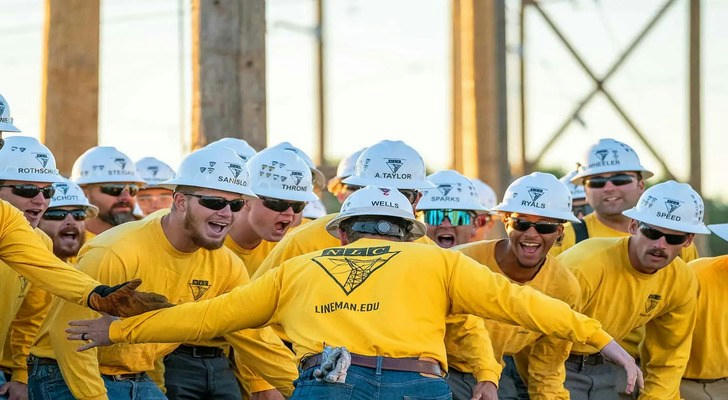Top Training Schools and Apprenticeship Programs for Linemen in the U.S.
Being a lineman isn’t your typical 9-to-5 job. It’s physically demanding and often requires working outdoors, at heights, and in bad weather.But it’s also a career that offers solid pay, strong job security, and a deep sense of purpose.

Pros of being a lineman:
• High pay: As of May 2024, the average annual salary is $92,560 (about $44.50/hour) according to the U.S. Bureau of Labor Statistics.
• No college degree needed: A high school diploma or equivalent is enough to start.
Challenges of the job:
• Physically demanding: Long hours, climbing poles, and handling heavy equipment.
• Weather exposure: Work in rain, snow, storms—even at night.
• Safety risks: High-voltage lines mean workers must follow strict safety rules.
Despite the risks, many linemen say the work is rewarding. It’s not just a job—it’s a career with real meaning and stability.
Recommended Lineman Training Schools in the U.S.
Starting your lineman journey often begins with a good training school. These schools teach essential skills like pole climbing, electrical systems, and safety procedures.
Top schools include:
1.Northwest Lineman College (NLC)
📍 Locations: Idaho, Texas, Florida, California
🕒 Training Duration: 15 weeks (Full-time)
🗣️Program: Electrical Lineworker Program
• Covers climbing, pole framing, rigging, transformers, and safety.
🎯 Employment Outcome:
Most graduates are hired within weeks after completing the program. The school partners with major utility companies and hosts job fairs on campus.
2.Southeast Lineman Training Center (SLTC)
📍 Location: Georgia
• 🕒 Training Duration: 15 weeks (Full-time, military-style schedule)
• 🗣️Program: Electrical Lineworker Program.
• Known for team-building drills and storm recovery simulations.
🎯 Employment Outcome:
Graduates are often recruited by companies in storm-prone areas due to SLTC’s strong reputation in emergency response training.
3.Texas A&M Engineering Extension Service (TEEX)
• All safety gear and equipment provided
📍 Location: Texas
🕒 Training Duration: 15–16 weeks
🗣️Program: Lineworker Academy
• Focused on hands-on utility pole work, transformer maintenance, and rescue training.
🎯 Employment Outcome:
Graduates have access to job placement services and strong industry ties. Many are hired by Texas-based utility companies immediately after finishing.
4.Alaska Joint Electrical Apprenticeship and Training Trust
📍 Location: Anchorage, Alaska
🕒 Training Duration: Varies, typically 4–6 months for initial certification.
🗣️Program: Lineworker Training
• Specialized training for cold-weather and extreme environments.
🎯 Employment Outcome:
Graduates often find work in remote or industrial sites in Alaska. The training is highly specialized, giving students an edge in cold-weather operations.
Apprenticeship Programs for Linemen
For many, apprenticeship is the most accessible and practical route into the trade. These programs let you “earn while you learn,” combining paid fieldwork with classroom instruction.
1.IBEW/NECA Apprenticeship (NJATC)
📍 Nationwide
🕒 Training Duration: 3–4 years (Paid apprenticeship with increasing wages).
• Run by the International Brotherhood of Electrical Workers (IBEW) and National Electrical Contractors Association (NECA).
🎯 Employment Outcome:
Upon completion, apprentices become certified journeymen with union membership, often securing long-term employment with major utility companies.
2.Utility-Sponsored Apprenticeships
📍 Offered by companies like:Offered by Duke Energy, FPL, PG&E, Xcel Energy, etc.
🕒 Training Duration: 3–4 years (Hands-on + classroom instruction)
🎯 Employment Outcome:
Most apprentices are offered full-time positions after completion. Training is often aligned with the hiring standards of the sponsoring company.
3.State/City Workforce Development Programs
📍 Varies by region
🕒 Training Duration: 4–12 months
🎯 Employment Outcome:
Graduates often transition into utility or infrastructure jobs. These programs are especially helpful for veterans, displaced workers, or low-income job seekers.
📘 Minimum Service Years and Penalty Clauses in Lineman Apprenticeship Programs
You don’t need a degree or prior experience to begin. Here are some ways to start:
Most lineman apprenticeship programs in the U.S. — especially those run by utilities or union partnerships like IBEW/NECA — do not require apprentices to sign legally binding service contracts with fixed "minimum service years." However, some utility-sponsored or workforce-subsidized programs may include employment agreements if they cover training costs, equipment, housing, or relocation support.
✅ 1. Union-Based Apprenticeships (e.g., IBEW/NECA NJATC)
• Minimum Service Commitment: ❌ Not contractually required.
• Penalty for Leaving Early: ❌ No financial penalty.
• Details: Since training is part of union dues or publicly funded, apprentices can leave at any time, though doing so may limit re-entry or future referrals.
✅ 2. Utility-Sponsored Apprenticeships (e.g., Duke Energy, PG&E)
• Minimum Service Commitment: ✅ Sometimes required (1–3 years)
• Penalty for Leaving Early: ✅ May include repayment of training costs($5,000–$15,000)
• Details: If a company directly sponsors your training (e.g., pays for tuition, housing, etc.), you may sign an agreement stating you must work for them for a certain time (usually 1–3 years). Leaving before the term could mean repaying $5,000–$15,000 depending on the investment.
✅ 3. State-Funded Workforce Development Programs
• Minimum Service Commitment: ✅ Sometimes required
• Penalty for Leaving Early: ⚠️ Varies by program and funding source
• Details: If you receive training grants under WIOA (Workforce Innovation and Opportunity Act), you generally won’t be penalized personally—but programs may prioritize candidates serious about staying in the industry.

Real-Life Story: Mike’s Journey
Mike Johnson from Ohio didn’t know his career path after high school—until a power outage changed everything. Watching linemen restore power in a storm sparked his interest. He applied for an IBEW apprenticeship, learned to climb, handle high-voltage lines, and now works full-time as a lineman. For Mike, this career brings not just income, but pride and purpose.
Conclusion:
Becoming a lineman means stepping into a job that’s hands-on, pays well, and truly matters. With strong job growth, great income potential, and the chance to make a difference, it’s a career worth considering—especially for those who want more than an office job.
